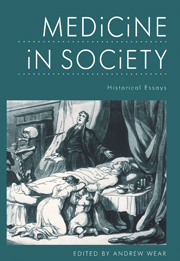Book contents
- Frontmatter
- Contents
- List of contributors
- Introduction
- Healers in the medical market place towards a social history of Graeco-Roman medicine
- Medicine and society in medieval Europe, 500-1500
- The patient in England, c. 1660–c. 1800
- Making sense of health and the environment in early modern England
- Medicine in the age of Enlightenment
- The rise of the modern hospital in Britain
- Medical practitioners 1750–1850 and the period of medical reform in Britain
- Public health, preventive medicine and professionalization: England and America in the nineteenth century
- Madness and its institutions
- From infectious to chronic diseases: changing patterns of sickness in the nineteenth and twentieth centuries
- Providers, ‘consumers’, the state and the delivery of health-care services in twentieth-century Britain
- The implications of increased life expectancy for family and social life
- Index
The rise of the modern hospital in Britain
Published online by Cambridge University Press: 13 January 2010
- Frontmatter
- Contents
- List of contributors
- Introduction
- Healers in the medical market place towards a social history of Graeco-Roman medicine
- Medicine and society in medieval Europe, 500-1500
- The patient in England, c. 1660–c. 1800
- Making sense of health and the environment in early modern England
- Medicine in the age of Enlightenment
- The rise of the modern hospital in Britain
- Medical practitioners 1750–1850 and the period of medical reform in Britain
- Public health, preventive medicine and professionalization: England and America in the nineteenth century
- Madness and its institutions
- From infectious to chronic diseases: changing patterns of sickness in the nineteenth and twentieth centuries
- Providers, ‘consumers’, the state and the delivery of health-care services in twentieth-century Britain
- The implications of increased life expectancy for family and social life
- Index
Summary
Hospitals today are central to health care in the West. Most people are born in hospital, many die there. Many will experience hospital treatment at some point in their lives. Hospitals are not only crucial for patients: they are vitally important for doctors as well. It is the medical elite that is hospital-based. It is the hospitals, too, with their technical, building and staff needs, that largely account for rising costs in medical care, even though non-hospital doctors, pharmacists, patients themselves and their relatives cope with most illness. However, the development of hospitals as the centrepoint of medical care is a recent phenomenon. Hospitals today may very well play a central role, but in 1700, certainly in Britain, they were peripheral. They were few in number, employed few people, used few resources, were financed on a largely voluntary basis and, above all, treated a very restricted social group of patients for a very restricted range of complaints.
The shift of hospitals from the margins to the centre in health care has become an expanding interest to social historians of medicine. Past histories of hospitals were mostly written by doctors from the institutions themselves. Fired by interest in their own hospital, they usually focused on it alone, and rarely sought to establish how far its history was part of a wider pattern. They usually adopted a positivist approach, seeing the history of medicine as the epitome of progress.
- Type
- Chapter
- Information
- Medicine in SocietyHistorical Essays, pp. 197 - 218Publisher: Cambridge University PressPrint publication year: 1992
- 5
- Cited by



